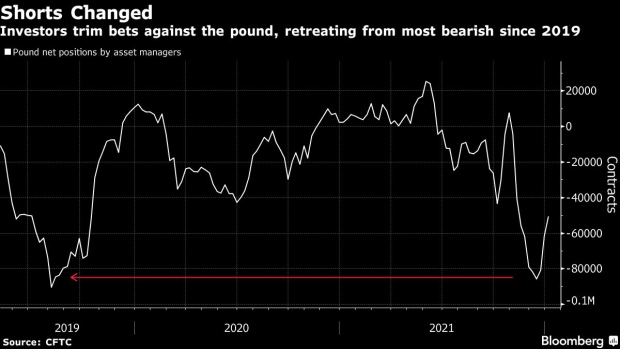Jan 15, 2022
Betting Against the U.K. Is a Favorite Trade in Currency Markets
, Bloomberg News

(Bloomberg) -- The pound’s best start to a year since 2018 is enticing the world’s biggest investors to bet against the U.K.
They see an economy hobbled by Brexit and inflation at the highest level in more than a decade as good reasons to be bleak. While the currency has thus far withstood Prime Minister Boris Johnson’s troubles, the prospect of higher taxes weighing on consumers is shoring up conviction that the pound’s current strength can’t last much longer.
“We would expect the pound to be struggling by the end of the quarter as the approaching U.K. April tax hike highlights the pressure on real incomes,” said Jane Foley, head of foreign-exchange strategy at Rabobank. “This will lead the market to rethink expectations about the amount of Bank of England rate hikes this year.”
She expects the pound to weaken to $1.33 by the end of the quarter, down from $1.37 currently. The currency has climbed about 1.3% this year, making it one of the strongest foreign-exchange performers.
James Athey, investment director at Aberdeen Asset Management, started betting this month that the pound will depreciate versus the yen. Amundi, Europe’s largest asset manager, is underweight sterling. Standard Bank’s Steven Barrow, whose bets returned more than 48% last year, is advising clients to short the pound against the dollar.
‘Overvalued Pound’
To Valentin Marinov, the head of G-10 currency research at Credit Agricole SA in London, the current level already reflects the Bank of England’s move to raise interest rates in December.
“We maintain a cautious outlook on the overvalued pound,” Marinov said.
Technical factors, like hedge-fund positioning, have also been responsible for the rally. Speculators sharply cut back on their bearish pound bets late last year, which helped drive the currency higher. With fewer shorts crowded in the market, there’s potentially room for them to pile back in again, Marinov said.
To be sure, other strategists like Goldman Sachs Group Inc. say the pound’s rally isn’t over yet. Options traders are also less wary. Bearishness on the pound is the lowest in almost two months, according to one-year risk reversals, a gauge of market positioning.
“U.K. labor data has been robust,” said Kamakshya Trivedi, Goldman’s co-head of global foreign exchange, rates and emerging-market strategy research in London. “There will be quite a strong sense that rates need to start moving higher given the inflation increase, and the so-far limited hit to the economy from the omicron variant.”
Yet for many, there’s still too much uncertainty. A closely-watched gauge of momentum, the 14-day relative-strength indicator, suggests the pound is overbought for the first time in 11 months.
Even bulls are circumspect. State Street Global Advisors Ltd. is long on the pound, but concedes supply-chain bottlenecks and labor shortages are major obstacles facing the economy.
“We still find it hard to be too positive on the U.K.,” said Altaf Kassam, the firm’s head of investment strategy and research for Europe, the Middle East and Africa.
Next Week
- Inflation will be the focus as euro-area nations and the U.K. report CPI data. Manufacturing and services PMI prints are also due out of France, Germany, euro area and the U.K.
- Britain will sell up to GBP2.5b of gilts, while Citigroup Inc. estimates around EU21b of bond sales from Germany, France, Finland and Spain
- Central bank speakers include ECB’s Villeroy and Holzmann, while BOE’s Mann will speak on the economy and monetary policy
©2022 Bloomberg L.P.